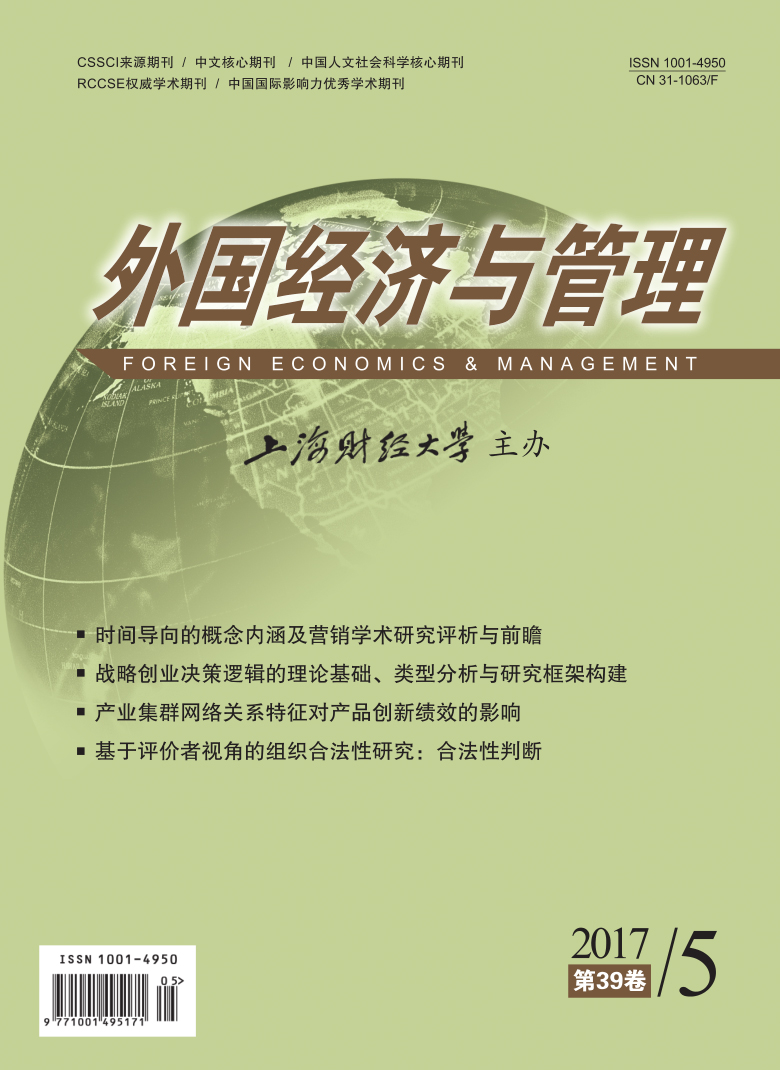子公司决策自主权是子公司的一种战略主动性,对跨国公司全球资源的有效利用具有重要意义。然而,子公司自主决策权具体对跨国公司发展有何战略性影响,当前学术界则关注较少且未进行验证。本文利用111家跨国公司子公司的多被访者调查数据,对子公司自主决策权与子公司绩效、母公司创新能力间的关系进行了实证研究,研究发现:子公司自主决策权对子公司绩效和母公司创新能力均有显著的正向影响,跨国公司全球导向在子公司自主决策权与母公司创新能力的关系中扮演显著的正向调节作用,而在子公司自主决策权与子公司绩效间关系中所扮演的调节作用并未得到支持。本研究不仅深化了资源依赖理论在国际商务研究中的应用,而且对跨国公司子公司管理和整体竞争能力提升具有重要的实践意义。
跨国公司子公司自主决策权的战略性影响研究
摘要
参考文献
4 Ambos T C, Ambos B, Schlegelmilch B B. Learning from foreign subsidiaries: An empirical investigation of headquarters’ benefits from reverse knowledge transfers[J]. International Business Review, 2006, 15(3): 294–312. DOI:10.1016/j.ibusrev.2006.01.002
5 Andersson U, Forsgren M, Holm U. Balancing subsidiary influence in the federative MNC: A business network view[J]. Journal of International Business Studies, 2007, 38(5): 802–818. DOI:10.1057/palgrave.jibs.8400292
6 Bagozzi R P. Evaluating structural equation models with unobservable variables and measurement error: A comment[J]. Journal of Marketing Research, 1981, 18(3): 375–381. DOI:10.2307/3150979
7 Berry H. Global integration and innovation: Multicountry knowledge generation within MNCs[J]. Strategic Management Journal, 2014, 35(6): 869–890. DOI:10.1002/smj.2014.35.issue-6
8 Birkinshaw J, Hood N, Jonsson S. Building firm-specific advantages in multinational corporations: The role of subsidiary initiative[J]. Strategic Management Journal, 1998, 19(3): 221–241. DOI:10.1002/(ISSN)1097-0266
9 Birkinshaw J M, Morrison A J. Configurations of strategy and structure in subsidiaries of multinational corporations[J]. Journal of International Business Studies, 1995, 26(4): 729–753. DOI:10.1057/palgrave.jibs.8490818
10 Bouquet C, Birkinshaw J. Managing power in the multinational corporation: How low-power actors gain influence[J]. Journal of Management, 2008a, 34(3): 477–508. DOI:10.1177/0149206308316062
11 Bouquet C, Birkinshaw J. Weight versus voice: How foreign subsidiaries gain attention from corporate headquarters[J]. Academy of Management Journal, 2008b, 51(3): 577–601. DOI:10.5465/AMJ.2008.32626039
12 Cantwell J, Mudambi R. MNE competence-creating subsidiary mandates[J]. Strategic Management Journal, 2005, 26(12): 1109–1128. DOI:10.1002/(ISSN)1097-0266
13 Ciabuschi F, Dellestrand H, Kappen P. The good, the bad, and the ugly: Technology transfer competence, rent-seeking, and bargaining power[J]. Journal of World Business, 2012, 47(4): 664–674. DOI:10.1016/j.jwb.2011.08.002
14 De Luca L M, Atuahene-Gima K. Market knowledge dimensions and cross-functional collaboration: Examining the different routes to product innovation performance[J]. Journal of Marketing, 2007, 71(1): 95–112. DOI:10.1509/jmkg.71.1.95
15 Fornell C, Larcker D F. Evaluating structural equation models with unobservable variables and measurement error[J]. Journal of Marketing Research, 1981, 18(1): 39–50. DOI:10.2307/3151312
16 Geppert M, Dörrenbächer C. Politics and power within multinational corporations: Mainstream studies, emerging critical approaches and suggestions for future research[J]. International Journal of Management Reviews, 2014, 16(2): 226–244. DOI:10.1111/ijmr.2014.16.issue-2
17 Gupta A K, Govindarajan V. Knowledge flows within multinational corporations[J]. Strategic Management Journal, 2000, 21(4): 473–496. DOI:10.1002/(ISSN)1097-0266
18 Kim H, Hoskisson R E, Wan W P. Power dependence, diversification strategy, and performance in keiretsu member firms[J]. Strategic Management Journal, 2004, 25(7): 613–636. DOI:10.1002/(ISSN)1097-0266
19 Mudambi R, Navarra P. Is knowledge power? Knowledge flows, subsidiary power and rent-seeking within MNCs[J]. Journal of International Business Studies, 2004, 35(5): 385–406. DOI:10.1057/palgrave.jibs.8400093
20 Mudambi R, Pedersen T, Andersson U. How subsidiaries gain power in multinational corporations[J]. Journal of World Business, 2014, 49(1): 101–113. DOI:10.1016/j.jwb.2013.02.001
21 Najafi-Tavani Z, Giroud A, Andersson U. The interplay of networking activities and internal knowledge actions for subsidiary influence within MNCs[J]. Journal of World Business, 2014, 49(1): 122–131. DOI:10.1016/j.jwb.2013.02.004
22 Rabbiosi L, Santangelo G D. Parent company benefits from reverse knowledge transfer: The role of the liability of newness in MNEs[J]. Journal of World Business, 2013, 48(1): 160–170. DOI:10.1016/j.jwb.2012.06.016
23 Rugman A M, Verbeke A. Subsidiary-specific advantages in multinational enterprises[J]. Strategic Management Journal, 2001, 22(3): 237–250. DOI:10.1002/(ISSN)1097-0266
24 Yamin M, Andersson U. Subsidiary importance in the MNC: What role does internal embeddedness play?[J]. International Business Review, 2011, 20(2): 151–162. DOI:10.1016/j.ibusrev.2010.07.005
25 Yamin M, Forsgren M. Hymer’s analysis of the multinational organization: Power retention and the demise of the federative MNE[J]. International Business Review, 2006, 15(2): 166–179. DOI:10.1016/j.ibusrev.2005.07.006
26 Zhang C, Viswanathan S, Henke J W Jr. The boundary spanning capabilities of purchasing agents in buyer–supplier trust development[J]. Journal of Operations Management, 2011, 29(4): 318–328. DOI:10.1016/j.jom.2010.07.001
27 Zou S M, Cavusgil S T. The GMS: A broad conceptualization of global marketing strategy and its effect on firm performance[J]. Journal of Marketing, 2002, 66(4): 40–56. DOI:10.1509/jmkg.66.4.40.18519
引用本文
王娜, 王永贵. 跨国公司子公司自主决策权的战略性影响研究[J]. 外国经济与管理, 2017, 39(5): 58–72.
导出参考文献,格式为:





 , 2
, 2 9354
9354  9894
9894

